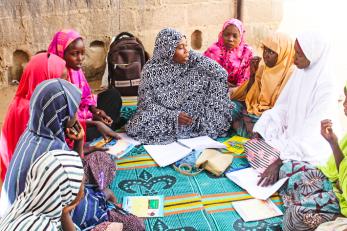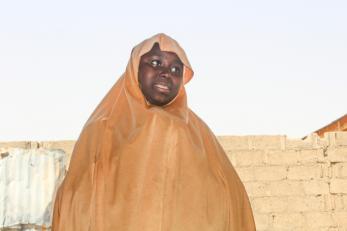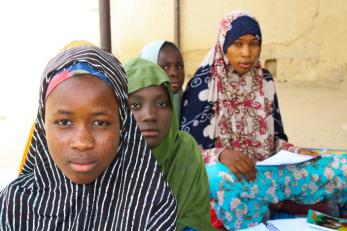Safe spaces: Expanding life opportunities for adolescents

Children and adolescents are the most affected by the protracted conflict in North-East Nigeria. In the face of the ensuing crisis, many families are forced to fend for themselves, depending on scarce resources. Essential factors for childhood development such as parental care, access to healthcare and quality education are most times often relegated to the background for survival. This often makes many adolescent boys and girls a soft target for Violent Extremist Organizations (VEOs), where they are either forced or coerced to join for various reasons.
Steering a new path of life for adolescents
Mercy Corps' Hadin Kai program is empowering adolescent girls and boys victimized by VEOs through safe space learning to create an enabling environment for their peaceful re-integration into the community. Through the support of community stakeholders and the guidance of mentors, these young boys and girls are able to thrive and live a better life.
“I applied to be a mentor because of the critical situation of boys and girls in my community. Many of them did not have the parental care they needed,” said Fatimah Abba Shettima, as she put the girls through a session.
During a visit to one of the female safe space group meetings in Bullabulin community, Borno state, Zara told us, "I didn’t know how to save money and take care of myself. But now, things have changed.”
The program adopted a curriculum that has been used by other Mercy Corps interventions in the Northeast through which the adolescents are taught the importance of life skills and increase their knowledge on financial literacy, hygiene, and health education on a weekly basis. It provides a safe haven for adolescents to connect with their peers and discuss issues that are bothering them.

Like Zara, Halima and many of the other girls in the group have had a difficult time settling in after the spate of crisis that befell their community in the past years. Through the safe space, they are taught the importance of saving and learning a skill, which has helped many of them to start and expand their business – common amongst them is the cap-knitting business. The girls say the business is very lucrative, from which they are able to save money, fend for themselves and pay their school fees.
The safe space provides them with a platform to share their experiences and bond with other girls. The girls expressed how happy they were, that the program has built their confidence and given them a voice, with the knowledge that they can make their own decisions with the support of their parents.
Changing the narrative on early marriage
Fatimah Shettima, one of the girls’ mentors talks about how it is common practice in the community for young girls to be married off as early as 12 to 14 years old. Noting that a girl who is not married at age 15 is often cast off as "too old." And for parents who have many children to survive on little, the dowry paid by the husband is a good source of income to keep the family going. She, however, noted that with lessons from the safe space, the narrative has changed for many of the girls on the program, who have also gone on to educate their peers. She said that many of them have decided to finish their secondary school education and wait until they are mature before they get married.
Aisha, 15, recounts a story of how her sister was married off at the age of 14 and was unable to go to school. She added that the sister now regrets her decision as she sees her peers attending secondary school, while she has no means of livelihood.
“Early marriage is not good for our age, but some girls will get married when they finish primary school. I told my aunty I did not want to marry at that age and I was able to finish my primary school education.” Said Aisha as she shares her story.
Mentors and community members as secondary beneficiaries

Mariam Usman, a mentor and a proud mother of two, shares how they as mentors have also benefited from the program. “I have also learned a lot from the curriculum, I learned about the importance of empowerment. I never had a business before I became a mentor, but now I have several things I sell. In the event that the safe space program stops, I will still have my business,” she said.
“Even those who have gotten married after leaving the safe space, say they now know how to take care of their children,” said Mariam Usman, as she puts the girls through an exercise.
Program Manager Shadrack Steven said the program also engages community members (particularly traditional and religious leaders) through dialogues, seeking to ensure that they support the process of peaceful integration of these adolescents. At the end of safe space sessions, there will be a graduation ceremony attended by all the community stakeholders, where the adolescents will showcase what they have learned.